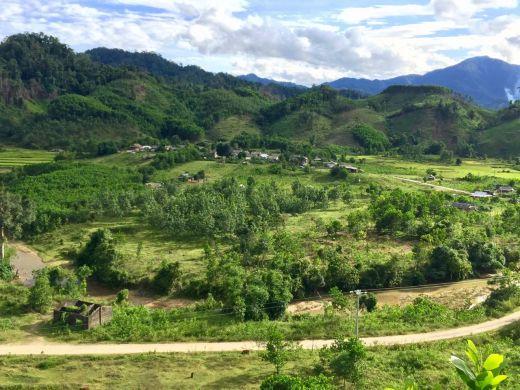Assessing the ‘nature’ of a ‘forest transition’ in Vietnam: ecosystem services and social-ecological resilience in locally managed forest landscapes

This project aims to substantially increase the understanding of tropical forest transitions in conjunction with prevailing policy and management regimes, in particular land tenure and payments for forest environmental services schemes. Correspondingly, the project contributes to strengthen rural social-ecological resilience.
About the project
Background
A ‘forest transition’ is a turnaround from historical forest loss to forest gain, as experienced by Switzerland since 1850. Forest regrowth may result from abandonment of less productive farmlands as a country modernizes and urbanizes, or, from policies and initiatives which promote forest protection or new plantations. Forest transitions have recently been described for several tropical countries, prominently including Vietnam, but the exact nature of the transitions and their feedback into development remain largely uninvestigated.
Objectives
Our aim is to contribute to a better understanding of tropical forest transitions as they relate to sustainable development. Focusing on a study site in Central Vietnam, we will (i) describe recent dynamics and causes of forest cover changes, including human uses and ecological succession in different forest types, and (ii) investigate consequences of these changes on availability of timber and non-timber products and other types of ecosystem services like watershed protection. We will (iii) assess the livelihood outcomes and valuations of different types of forests for local stakeholders within current institutional, economic, and policy contexts; in particular, we will (iv) investigate the effectiveness of new ‘payments for forest environmental services’ policies.
The project will contribute to sustainable forest management in a region characterized by rapid change, including deforestation, Acacia plantations, and new, innovative policies promoting watershed protection, ecosystem payments, and community benefits. The project features a strong collaboration between partners at the University of Lausanne and different research, teaching, and civil society organizations in Thua Thien Hue province, Vietnam.
Relevance
Our project will generate essential information on the impacts of diverse processes (policy renovation, socio-economic change, ecological dynamics) in achieving a practical, sustainable forest management regime that maintains, restores and optimizes key forest ecosystem functions and services from both planted and natural forests. Research will be connected to outreach programs, including capacity building for forest professionals, knowledge exchange between stakeholders, and evidence-based policy improvements and innovations.
Highlights and most important results
The project features a strong collaboration between partners at the University of Lausanne and different research, teaching, and civil society organizations in Thua Thien Hue province, Vietnam. The project is researching ecological and social aspects of forest dynamics, with view to contributing to sustainable forest management in a region characterized by rapid change, including deforestation, Acacia plantations, and new, innovative policies promoting watershed protection, ecosystem payments, and community benefits.
In the first year we conducted a detailed survey of natural forests along a lowland-upland transect across the Truong Son Mountain range (from Nam Dong Valley to the Lao border). This survey will provide key insights into the state and intrinsic ecological processes of these biodiverse but human-influenced forests – information needed for better-targeted and effective forest management and conservation activities. In addition, we have started studies on 1) the management, livelihood-benefits and ecology of exotic species (mainly Australian acacia) plantation ‘forests’, 2) hydrological functions of forests and tree plantations, and 3) people’s livelihood options and identities within a context of dynamic forest landscapes and forest related policies.
Geographic scope
- Vietnam, with focus on study site in Thua Thien-Hue province, and application to broader southeast Asian region
Project website and links to P3
- Link to project website
- Links to project phase
) and project phase
) on SNSF research database P3
